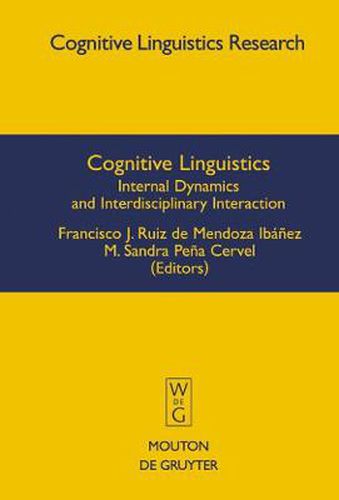Readings Newsletter
Become a Readings Member to make your shopping experience even easier.
Sign in or sign up for free!
You’re not far away from qualifying for FREE standard shipping within Australia
You’ve qualified for FREE standard shipping within Australia
The cart is loading…






This title is printed to order. This book may have been self-published. If so, we cannot guarantee the quality of the content. In the main most books will have gone through the editing process however some may not. We therefore suggest that you be aware of this before ordering this book. If in doubt check either the author or publisher’s details as we are unable to accept any returns unless they are faulty. Please contact us if you have any questions.
The book testifies of the great tolerance of Cognitive Linguists towards internal variety within itself and towards external interaction with major linguistic subdisciplines. Internally, it opens up the broad variety of CL strands and the cognitive unity between convergent linguistic disciplines. Externally, it provides a wide overview of the connections between cognition and social, psychological, pragmatic, and discourse-oriented dimensions of language, which will make this book attractive to scholars from different persuasions. The book is thus expected to raise productive debate inside and outside the CL community. Furthermore, the book examines interdisciplinary connections from the point of view of the internal dynamics of CL research itself. CL is rapidly developing into different compatible frameworks with extensions into levels of linguistics description like discourse, pragmatics, and sociolinguistics among others that have only recently been taken into account in this orientation.
The book covers two general topics: (i) the relationship between the embodied nature of language, cultural models, and social action; (ii) the role of metaphor and metonymy in inferential activity and as generators of discourse ties. More specific topics are the nature and scope of constructional meaning, language variation and cultural models; discourse acts; the relationship between communication and cognition, the argumentative role of metaphor in discourse, the role of mental spaces in linguistic processing, and the role of empirical work in CL research. These features endow the book with internal unity and consistency while preserving the identity of each of the contributions therein.
$9.00 standard shipping within Australia
FREE standard shipping within Australia for orders over $100.00
Express & International shipping calculated at checkout
This title is printed to order. This book may have been self-published. If so, we cannot guarantee the quality of the content. In the main most books will have gone through the editing process however some may not. We therefore suggest that you be aware of this before ordering this book. If in doubt check either the author or publisher’s details as we are unable to accept any returns unless they are faulty. Please contact us if you have any questions.
The book testifies of the great tolerance of Cognitive Linguists towards internal variety within itself and towards external interaction with major linguistic subdisciplines. Internally, it opens up the broad variety of CL strands and the cognitive unity between convergent linguistic disciplines. Externally, it provides a wide overview of the connections between cognition and social, psychological, pragmatic, and discourse-oriented dimensions of language, which will make this book attractive to scholars from different persuasions. The book is thus expected to raise productive debate inside and outside the CL community. Furthermore, the book examines interdisciplinary connections from the point of view of the internal dynamics of CL research itself. CL is rapidly developing into different compatible frameworks with extensions into levels of linguistics description like discourse, pragmatics, and sociolinguistics among others that have only recently been taken into account in this orientation.
The book covers two general topics: (i) the relationship between the embodied nature of language, cultural models, and social action; (ii) the role of metaphor and metonymy in inferential activity and as generators of discourse ties. More specific topics are the nature and scope of constructional meaning, language variation and cultural models; discourse acts; the relationship between communication and cognition, the argumentative role of metaphor in discourse, the role of mental spaces in linguistic processing, and the role of empirical work in CL research. These features endow the book with internal unity and consistency while preserving the identity of each of the contributions therein.